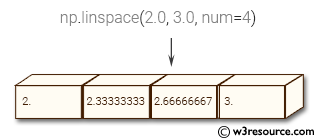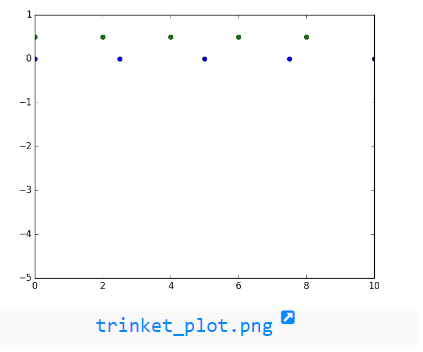NumPy: numpy.linspace() function
numpy.linspace() function
The numpy.linspace() function is used to create an array of evenly spaced numbers within a specified range. The range is defined by the start and end points of the sequence, and the number of evenly spaced points to be generated between them.
Syntax:
numpy.linspace(start, stop, num=50, endpoint=True, retstep=False, dtype=None)

Parameters:
| Name | Description | Required / Optional |
|---|---|---|
| start | The starting value of the sequence. | Required |
| stop | The end value of the sequence, unless endpoint is set to False. In that case, the sequence consists of all but the last of num + 1 evenly spaced samples, so that stop is excluded. Note that the step size changes when endpoint is False. | Required |
| num | Number of samples to generate. Default is 50. Must be non-negative. | Optional |
| endpoint | If True, stop is the last sample. Otherwise, it is not included. Default is True. | Optional |
| retstep | If True, return (samples, step), where step is the spacing between samples. | Optional |
| dtype | The type of the output array. If dtype is not given, infer the data type from the other input arguments. New in version 1.9.0. |
Optional |
Return value:
ndarray - There are num equally spaced samples in the closed interval [start, stop] or the half-open interval [start, stop) (depending on whether endpoint is True or False).
step : float, optional - Only returned if retstep is True
Size of spacing between samples.
Example: Generating evenly spaced values with numpy linspace()
>>> import numpy as np
>>> np.linspace(3.0, 4.0, num=7)
array([ 3. , 3.16666667, 3.33333333, 3.5 , 3.66666667,
3.83333333, 4. ])
>>> np.linspace(3.0,4.0, num=7, endpoint=False)
array([ 3. , 3.14285714, 3.28571429, 3.42857143, 3.57142857,
3.71428571, 3.85714286])
>>> np.linspace(3.0,4.0, num=7, retstep=True)
(array([ 3. , 3.16666667, 3.33333333, 3.5 , 3.66666667,
3.83333333, 4. ]), 0.16666666666666666)
The above code demonstrates the usage of numpy's linspace() function for generating evenly spaced values within a specified interval. The function takes three main arguments: start point, end point, and the number of values to be generated.
In the first example, linspace() generates 7 values between 3.0 and 4.0, including the endpoint of 4.0.
In the second example, the endpoint is excluded by setting the optional parameter 'endpoint' to False, and linspace() generates 7 values with equal spacing between 3.0 and 4.0.
In the third example, the optional parameter 'retstep' is set to True, which returns a tuple containing the generated array and the step size between adjacent values.
Pictorial Presentation:


Example: Plotting Points with Matplotlib
>>> import numpy as np
>>> import matplotlib.pyplot as plt
>>> A = 5
>>> x = np.zeros(A)
>>> a1 = np.linspace(0, 10, A, endpoint=True)
>>> a2 = np.linspace(0, 10, A, endpoint=False)
>>> plt.plot(a1, x, 'o')
[<matplotlib.lines.Line2D object at 0x7f3d13a48080>]
>>> plt.plot(a2, x + 0.5, 'o')
[<matplotlib.lines.Line2D object at 0x7f3d1b582438>]
>>> plt.ylim([-5.0, 1])
(-5.0, 1)
>>> plt.show()
The above code uses the numpy and matplotlib.pyplot libraries to create a simple plot of points.
1. A is set to 5 and x is created as a numpy array of 5 zeros.
2. Two arrays a1 and a2 are created using numpy.linspace method, which returns evenly spaced numbers over a specified interval.
3.
plt.plot is used to create two sets of points on the plot.
numpy.linspace.plot show

Python - NumPy Code Editor:
Previous: arange()
Next: logspace()
